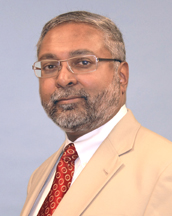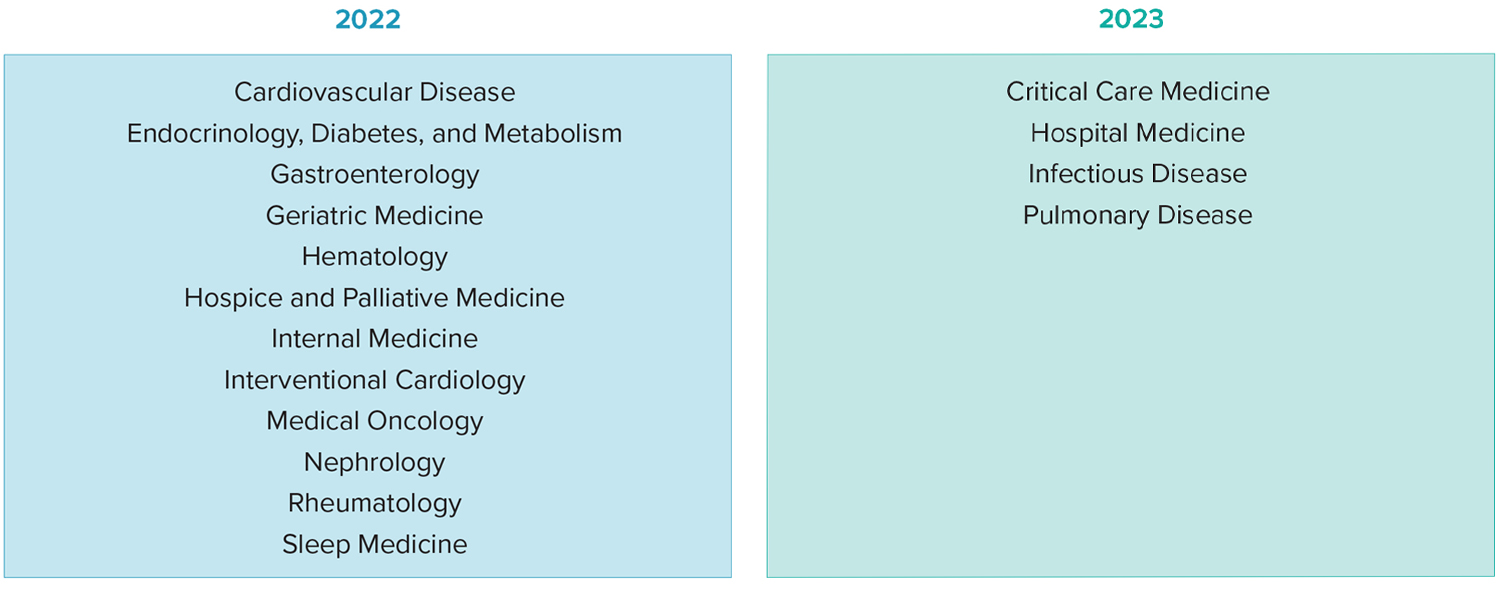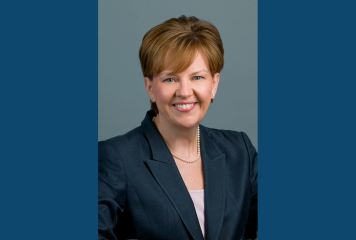Summary Report: Fall 2020 Infectious Disease Board Meeting
October 20, 2020 | Posted by ABIM | Uncategorized
Fall 2020 Meeting
The fall meeting of the Infectious Disease Board comes at an extremely important time for ABIM and its diplomates. The ongoing fight against the COVID-19 pandemic has brought many challenges upon the physician community, and it is against this backdrop that ABIM virtually convened the eight members of the Infectious Disease Board to discuss moving the discipline forward.
Below is a recap of the key topics discussed during the fall meeting:

Leadership Update
Richard J. Baron, MD, ABIM President and CEO, addressed the Infectious Disease Board and commented on recent issues that have arisen in health care due to the pandemic, including the disparities in COVID-19 infection and mortality rates in Black and Brown communities. He reiterated the important role ABIM and the ABIM Foundation play in addressing these issues, calling forth the organization’s joint Statement on Racial Justice issued over the summer. He also noted the increasing mistrust in medicine and institutions occurring broadly across swaths of society, and that ABIM Board Certification may be more meaningful now than ever as it serves as a demonstration of knowledge and professionalism upon which patients rely.
He then highlighted key ABIM policy decisions that were made this spring to offer physicians more flexibility in maintaining their certification in response to the pandemic:
- No one will lose certification if they aren’t able to complete a Maintenance of Certification (MOC) requirement this year.
- Physicians that have an assessment, attestation or points due in 2020 will have until 12/31/21 to complete them.
- Physicians currently in their grace year will be afforded an additional grace year in 2021.
- Those physicians whose Board Eligibility expires in 2020 may take the exam in their discipline in either 2020 or 2021, whichever works best for their individual situation.
Dr. Baron also provided an update on progress in developing a longitudinal assessment pathway, scheduled to launch in Infectious Disease in 2023. While this new pathway will better integrate education with assessment, Dr. Baron noted that it is still an assessment, and that a summative pass/fail judgement will be made at the end of a five-year cycle. More information about the longitudinal assessment pathway can be found later in the Specialty Board meeting summary.
How COVID-19 is Affecting our Discipline
The group discussed the many challenges facing infectious disease specialists right now, including knowing colleagues who have fallen ill themselves. It was brought to light that junior faculty have been especially impacted because of increased clinical responsibility relative to what their position entails. Trainees have also been asked to take on additional responsibilities outside of their education plan, while social activities for bonding purposes have been eliminated as a safety precaution.
A discussion unfolded about ways to share resources – even virtually – in times of disparities and shortages with regard to ID specialists. Telemedicine was suggested as a way to overcome the challenges, and now that it has become so widely adopted during the pandemic, it was posited that it is here to stay as a way to treat patients. Project ECHO was cited as a guided-practice model that reduces health disparities in under-served and remote areas through innovative telementoring.
Board members did note that one silver lining of the pandemic is that it has brought an increased interest to the specialty, and fellowship applications appear to be trending upward. Also, members commented that is has been encouraging to see so many institutions collaborating well in the midst of chaos.
Updates from IDSA
Christopher D. Busky, CEO of the Infectious Diseases Society of America (IDSA), was a guest at the meeting and provided an update on recent society developments. He highlighted IDSA’s COVID-19 Real-Time Learning Network, an online resource center that compiles rapid, living guidelines along with other timely resources for clinicians working on the front lines of the pandemic. He also touched on the virtual IDWeek meeting October 21-25, which is preceded by a novel 24-hour Chasing the Sun event – a global event featuring COVID-related sessions developed in partnership with many organizations around the world. Finally, Mr. Busky stressed IDSA’s commitment to ensuring federal policies and guidelines are guided by science, not politics.
New proposed ABMS Standards
The American Board of Medical Specialties (ABMS) Standards Task Force was created in July 2019 as a byproduct of the ABMS-sponsored Continuing Board Certification: Vision for the Future Commission (Vision Commission). The group is drafting new standards, incorporating many recommendations of the Vision Commission. It is anticipated that a draft of the new standards will be available for public comment in late 2020/early 2021 – with potential adoption of final standards by ABMS in mid-2021. The Specialty Board anticipates discussing this topic again at its spring meeting once the new ABMS draft standards have been made public.
Reimagining the MOC Point System
ABIM has taken a proactive approach to evaluating its MOC points system, which is aligned with the ABMS requirements for lifelong learning and self-assessment. Currently, ABIM diplomates are required to earn 100 MOC points every five years to maintain their certification, and to earn any amount of points every two years to be listed as “participating in MOC.”
Specialty Board members provided observations about the current MOC points system and whether they thought it helped ID specialists stay current in knowledge and practice. They also discussed knowledge areas and skills that could be better recognized in the current MOC system, or by new activities created by external partners (e.g. professional societies, healthcare systems, medical schools). This topic will be explored again at future ABIM Governance meetings, and ABIM is planning outreach to diplomates and stakeholder organizations this fall in order to gather feedback.
Longitudinal Assessment Pathway Update
The Infectious Disease Board dedicated a session to discussing progress on the longitudinal assessment pathway, scheduled to become available in Infectious Disease in 2023. See below for the full rollout schedule:
Infectious Disease and three other specialties that were especially hard hit by COVID-19 are rolling out a year later because volunteer recruitment to help write ABIM test questions has been more challenging. ABIM leadership consulted with physicians currently serving on its Exam Committees and Item Writing Task Forces in these four disciplines and decided to move the launch date to 2023 to allow more time for volunteer recruitment and item creation.
Learn more in a 2-minute video from Randall S. Edson, MD, Chair of ABIM’s Infectious Disease Exam Committee Board.
Since the longitudinal pathway was first announced in August 2019, ABIM has released many details:
- The longitudinal assessment pathway will have a five-year cycle and include both a participation requirement and performance standard:
- Participation: 120 questions are offered each year, and physicians can skip up to 100 questions over the course of the five-year cycle.
- Performance: Feedback relative to the standard will be provided over the course of the five-year cycle, and a final passing determination will be calculated at the end of year five.
- It is a lower-stakes assessment option:
- Physicians cannot lose certification if they do not successfully meet the participation requirement or performance standard.
- In those instances, they must pass the traditional, 10-year MOC exam the following year to remain certified.
- There are many key features of longitudinal assessment that differentiate it from ABIM’s current assessment options, some of which include:
- The assessment promotes learning by providing immediate feedback, rationales and references after each question.
- Questions can be answered any place or time with no camera monitoring, and the platform will be available via mobile phone.
- Physicians will have four minutes to answer each question, along with a pool of extra time to access if necessary.
Infectious Disease Board members discussed the longitudinal assessment updates with senior ABIM staff, and shared their thoughts on what has been developed thus far as well as the elements of the pathway that still need to be formalized. They were especially interested in how the standard is established for the passing score with longitudinal. Senior ABIM staff explained that, for the first five years of longitudinal assessment, ABIM will use the standard that is already established for the traditional 10-year MOC Exam but may look to evolve the standard in the future. Read more about the rationale behind the longitudinal pathway and our progress to date in a recent Clinical Infectious Diseases (CID) article penned by Dr. Abraham and fellow Infectious Disease Board member, Howard Heller, MD.
Diplomates are encouraged to provide feedback as additional features of the longitudinal pathway are still in development.
Enhancing the Connection between ABIM Governance and the Physician Community
ABIM Governance includes a diverse and talented group of over 350 members across more than 50 boards and committees. They are critical to helping ABIM achieve its mission to enhance the quality of health care by certifying internists and subspecialists who demonstrate the knowledge, skills and attitudes essential for excellent patient care. One of the ways they do this is by being connected to the community – sharing updates, having conversations with colleagues and collecting feedback.
During this session, members discussed ways to effectively communicate with the community and some shared their firsthand experiences. They spoke of simple engagement such as initiating a conversation with colleagues to garner feedback on longitudinal assessment, or more in-depth activities such as writing articles, making presentations or recording videos to better connect with fellow physicians on a personal level.
In Closing
The Infectious Disease Board welcomes feedback and commentary from diplomates, society partners and the greater medical community.
Do you have any questions? Are you interested in how to get involved?
If you have questions after reading this report, please connect with us through the following channels:
- Subscribe to the ABIM blog
- Call:1-800-441-ABIM (2246)
- Email: request@abim.org
- Join our Governance to help guide our future direction
- Join our Community Insights Network to share your feedback.
- Share your feedback on the new longitudinal assessment




